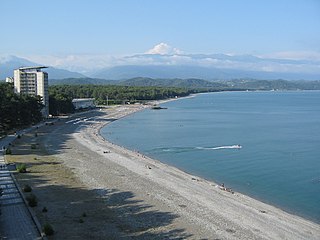
The United Nations Truce Supervision Organization (UNTSO) is an organization founded on 29 May 1948 for peacekeeping in the Middle East. Established amidst the 1948 Arab–Israeli War, its primary task was initially to provide the military command structure to the peacekeeping forces in the Middle East to enable the peacekeepers to observe and maintain the ceasefire, and in assisting the parties to the Armistice Agreements in the supervision of the application and observance of the terms of those Agreements. The organization's structure and role has evolved over time as a result of the various conflicts in the region and at times UNTSO personnel have been used to rapidly deploy to other areas of the Middle East in support of other United Nations operations. The command structure of the UNTSO was maintained to cover the later peacekeeping organisations of the United Nations Disengagement Observer Force (UNDOF) and the United Nations Interim Force in Lebanon (UNIFIL) to which UNTSO continues to provide military observers.

The United Nations Mission for the Referendum in Western Sahara is the United Nations peacekeeping mission in Western Sahara, established in 1991 under United Nations Security Council Resolution 690 as part of the Settlement Plan, which had paved way for a cease-fire in the conflict between Morocco and the Polisario Front over the contested territory of Western Sahara.

The United Nations Observer Mission in Georgia (UNOMIG) was established by United Nations Security Council Resolution 858 on 24 August 1993 to verify compliance with a 27 July 1993 ceasefire agreement between the Republic of Georgia and forces in Abkhazia with special attention given to the situation in the city of Sukhumi, Georgia. It was also to investigate reports of ceasefire violations, attempt to resolve such incidents with the parties involved, and to report to the Secretary-General of the United Nations on the implementation of its mandate. 88 military advisors were authorized to be deployed to the region. It ended on 15 June 2009, when Russia vetoed an extension of the mission. The last observers left the region on 15 July 2009.

United Nations Security Council Resolution 73, adopted on August 11, 1949, noted with satisfaction the Armistice Agreements between the parties involved in the 1948 conflict in Palestine and then expressed the hope that a final settlement of all questions outstanding between the parties might be achieved soon. The Resolution went on to relieve the Action Mediator in Palestine, as his duties had been fulfilled, and requested the Secretary-General arrange for the continued service of the personnel of the present Truce Supervision Organization as may be required in observing and maintaining the cease-fires and Armistices. The Resolution also requested that the Chief of Staff of the TSO report to the Council on the observance of the cease-fire.

United Nations Security Council Resolution 89, adopted on November 17, 1950, after receiving complaints from Egypt, Israel, Jordan and the Chief of Staff of the Truce Supervision Organization regarding the implementation of the Armistice Agreements designed to end the Arab-Israeli War the Council requested the Egypt-Israel Mixed Armistice Commission give urgent attention to a complaint of expulsion of thousands of Palestinian Arabs. The Council called upon both parties to give effect to any finding by the Commission, repatriating any such Arabs who the Commission believes to be entitled to return. The Council then authorized the Chief of Staff of the Truce Supervision Organization to recommend to Israel, Egypt and such other Arab States appropriate steps he may consider necessary to control the movement of nomadic Arabs across international frontiers or armistice lines by mutual agreement.

United Nations Security Council Resolution 92, adopted on May 8, 1951, recalling its previous resolutions demanding a cease-fire in the Arab-Israeli conflict the Council noted with concern that fighting had broken out in and around the demilitarized zone established by the Israel-Syrian General Armistice Agreement of 20 July 1949 and that fighting was continuing despite the cease-fire order of the Acting Chief of Staff of the United Nations Truce Supervision Organization in Palestine. The Council called upon the parties of persons in the areas concerned to cease fighting and called them to comply with their obligations and commitments to previous resolutions and Agreements.

United Nations Security Council Resolution 93, adopted on May 18, 1951, after hearing a report from the Chief of Staff of the United Nations Truce Supervision Organization in Palestine, the representatives of Egypt and Israel as well as a determination by the Egyptian-Israel Mixed Armistice Commission that determined that a “prearranged and planned attack ordered by Israel authorities” was “committed by Israel regular army forces against the Egyptian regular army” in the Gaza Strip on February 28, 1951. The Council condemned this attack as a violation of the cease-fire previsions of UNSC Resolution 54 and as inconsistent with the obligations of the parties under the General Armistice Agreement between Egypt and Israel and under the United Nations Charter. The Council again called upon Israel to take all necessary measures to prevent such actions and expressed its conviction that the maintenance of the General Armistice Agreement is threatened by any deliberate violation of it and that no progress towards the return of peace in Palestine can be made until both parties comply strictly with their obligations.

United Nations Security Council Resolution 106 was adopted unanimously on March 29, 1955, after hearing reports from the Chief of Staff of the United Nations Truce Supervision Organization in Palestine and representatives of Egypt and Israel. The Council noted that the Egyptian-Israel Mixed Armistice Commission determined that a "prearranged and planned attack ordered by Israel authorities" was committed by regular Israeli forces against elements of the Egyptian Army in the Gaza Strip on February 28, 1955. The Council condemned this attack as a violation of United Nations Security Council Resolution 54, called upon Israel to take all necessary measures to prevent such action, expressed its conviction that the maintenance of the General Armistice Agreement was threatened by deliberate violations and that no progress towards the return of permanent peace in Palestine would be made unless the parties complied strictly with their obligations.

United Nations Security Council Resolution 111, adopted unanimously on January 19, 1956, noted that according to the Chief of Staff of the United Nations Truce Supervision Organization in Palestine, Israel was in direct violation of the General Armistice Agreement and that there was interference by the Syrian Authorities with Israeli activities on Lake Tiberias. The Council held that this interference in no way justified Israel’s actions and condemned her for them.

United Nations Security Council Resolution 113, adopted on April 4, 1956, after recalling past resolutions where the Chief of Staff of the United Nations Truce Supervision Organization in Palestine was requested to undertake certain specific steps for the purpose of reducing tensions along the armistice lines the Council noted with grave concern the proposed steps had not been carried out. The Council considered the situation as likely to endanger the maintenance of international peace and security and requested the Secretary-General survey the various aspects of enforcement of compliance with the four General Armistice Agreements.

United Nations Security Council Resolution 114, adopted unanimously on June 4, 1956, after receiving a report from the Secretary-General the Council noted that progress had been made towards the adoption of the specific measures set out in United Nations Security Council Resolution 113 but that full compliance with the General Armistice Agreements and a host of Council Resolutions had not yet been effected. The Council declared that all parties to the Armistice Agreements should cooperate with the Secretary-General and the Chief of Staff of the United Nations Truce Supervision Organization in Palestine and that United Nations observers must be given full freedom of movement.

United Nations Security Council Resolution 127, adopted on January 22, 1958, dealt with complaints by Jordan regarding Israeli activities between the armistice demarcation lines. Taking into account a report by the Acting Chief of Staff of the United Nations Truce Supervision Organization in Palestine, the Council noted that neither Israel or Jordan enjoyed sovereignty over any part of the zone. The Council then directed the Chief of Staff to regulate activities within the zone so that Israelis would not be allowed to use Arab-owned properties and vice versa, and directed the Chief of Staff to conduct a survey of property records with a view to determine property ownership in the zone.

United Nations Security Council Resolution 171 was adopted on April 9, 1962. Following a report by the Chief of Staff of the United Nations Truce Supervision Organization in Palestine (TSO) regarding military activities in the Lake Tiberius area, along with statements by Syrian and Israeli representatives, the Council condemned both parties for their actions and determined that Israel had flagrantly violated UN resolutions.

United Nations Security Council resolution 881, adopted unanimously on 4 November 1993, after reaffirming resolutions 849 (1993), 854 (1993), 858 (1993) and 876 (1993) concerning the Georgian–Abkhazian war, the Council extended the mandate of the United Nations Observer Mission in Georgia (UNOMIG) until 31 January 1994.

United Nations Security Council resolution 915 was adopted unanimously on 4 May 1994. While reaffirming Resolution 910 (1994), the Council, acting on a recommendation by the UN Secretary-General Boutros Boutros-Ghali, established the United Nations Aouzou Strip Observer Group (UNASOG) to supervise the withdrawal of Libyan forces from the Aouzou Strip following an International Court of Justice opinion rendered in the Libya–Chad Territorial Dispute case that the strip formed part of the territory of Chad.

United Nations Security Council resolution 1113, adopted unanimously on 12 June 1997, after recalling all resolutions on the situation in Tajikistan and the Tajik-Afghan border, the Council extended the mandate of the United Nations Mission of Observers in Tajikistan (UNMOT) for a period of three months until 15 September 1997.

United Nations Security Council resolution 1124, adopted unanimously on 31 July 1997, after reaffirming all resolutions on Georgia, particularly Resolution 1096 (1997), the Council extended the mandate of the United Nations Observer Mission in Georgia (UNOMIG) until 31 January 1998.

United Nations Security Council resolution 1204, adopted unanimously on 30 October 1998, after reaffirming all previous resolutions on the question of the Western Sahara, the Council extended the mandate of the United Nations Mission for the Referendum in Western Sahara (MINURSO) until 17 December 1998.

United Nations Security Council resolution 1220, adopted unanimously on 12 January 1999, after recalling Resolution 1181 (1998) on the situation in Sierra Leone, the Council extended the mandate of the United Nations Observer Mission in Sierra Leone (UNOMSIL) until 13 March 1999.
United Nations Security Council resolution 1312, adopted unanimously on 31 July 2000, after reaffirming resolutions 1298 (1999) on the situation between Eritrea and Ethiopia, and 1308 (2000), the council established the United Nations Mission in Ethiopia and Eritrea (UNMEE) in anticipation of a peacekeeping operation subject to future authorisation.








